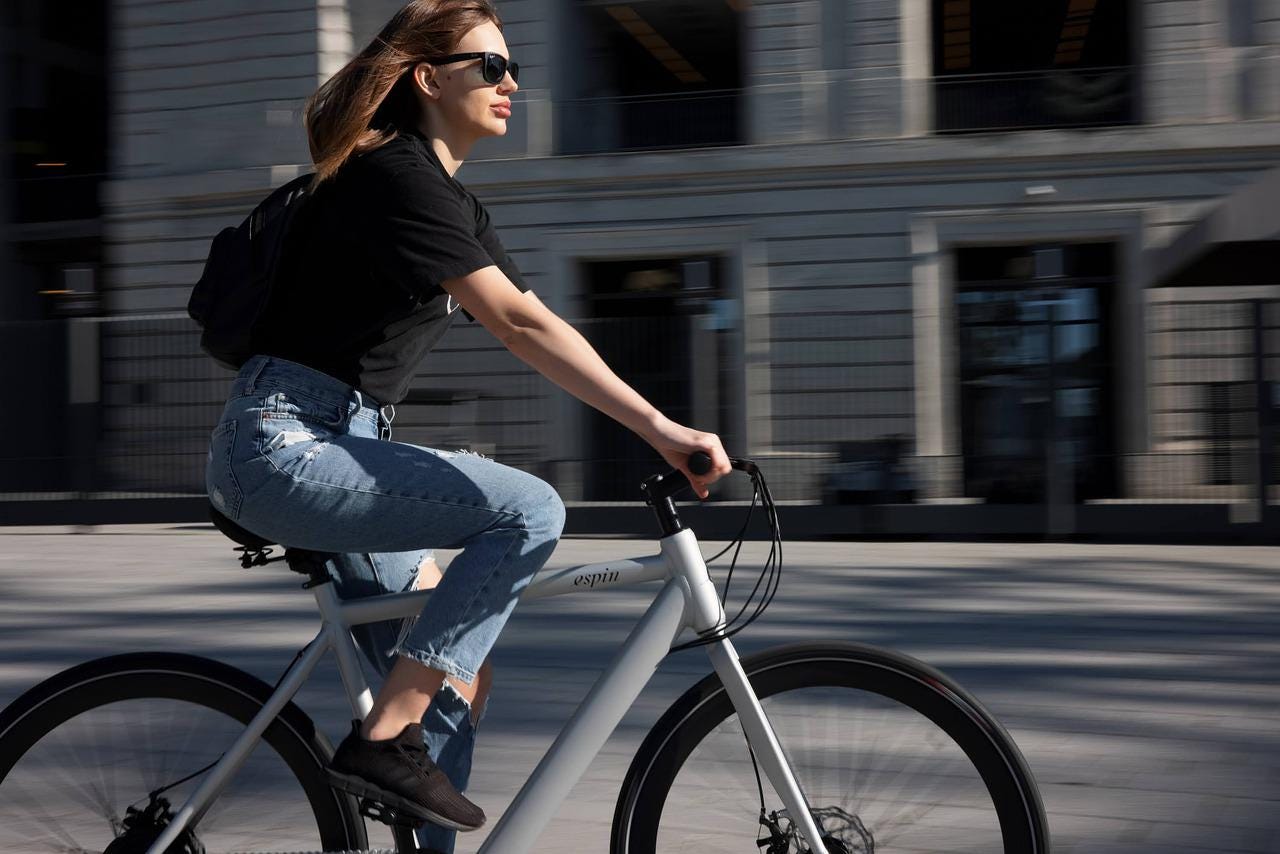COVID-19 can't kill healthy mobility!
Coming out of a 2-year period of keeping our distance from each other, there are encouraging signs of healthy transportation.
There was a touchy period where transportation experts were wondering if COVID was going to scare everyone into driving solo even more than we already do. Here’s my crystal ball reading of the future of mobility.
Electric bikes will transform urban and suburban transportation.
With a little bit of pedaling, you get up to 20 mph. These mobility marvels come with a hefty price tag to purchase outright, but that’s not stopping consumers. In a year, e-bikes sold twice as many units as electric cars!
From an urban planning perspective, e-bikes are appealing to a diverse group of people who would otherwise not get on a bicycle. Bike advocates often refer to the “interested but concerned” population who would use bicycles for transportation if some barriers were removed. It’s not the same level of exercise as a traditional pedal bike, but it is replacing a car trip.
E-bikes are appealing to people who haven’t ridden in years, or who feel out of shape. Or for people suffering from Parkinson’s:
E-bikes will play an important role in the retrofitting of suburbia, connecting land uses previously considered “not bikeable.”
Don’t fall for “e-bikes are cheating” claim by cycling purists. These machines will get more butts out of cars and onto bikes.
Are scooters a nuisance or new mobility
The bicycle is the most efficient form of transportation on the planet. It’s powered by humans, and humans merely require food and water to refuel. No electric device will ever replace the traditional bicycle. And as long as there is a demand for bicycling in urbanized areas, there will be a demand for comfortable bicycling infrastructure.
There is growing debate among cycling advocates as to whether e-scooters are friend or foe. It’s true that standing on a platform that zips along at 15 mph doesn’t burn the same calories as pedaling a lightweight machine. However, access to e-scooters does encourage people to leave their car parked and walk more.
Common ground among advocates of bike share, active lifestyles, sustainability, and urban planning is this: reduce single occupant vehicles. The extent of the impact on bike share remains to be seen, but e-scooters are a welcome addition to the mobility world.
Politicians need your help with this issue, because their motivation to get reelected leaves them vulnerable to yelps about banning scooters. They need perspective.
Mobility-as-a-Service
MaaS is on-demand transportation that combines trip and route planning, vehicle type, and payment collection. MaaS focuses on the customer by simplifying and streamlining trips. Households will reduce the number of owned vehicles because of the ease of use and cost savings of fleet-based transport.
Netflix famously recognized the developing subscription culture. They offered increased access, convenience, and affordability while removing the burdens of ownership. Movies as a Service. Mobility operations built on historic ownership trends will become the Blockbuster Videos of the transportation industry.
Mobility will soon be integrated with other X-as-a-Service options like groceries, clothing, pet care, gaming, education, and cleaning. MaaS will be transformational to 21st century society.
Most of the speculation on MaaS has been siloed by mode. “It’s just more car share!” The benefits and impacts of MaaS should be explored in light of every form of travel simultaneously (yes, even cars). Customers need choice, so explore all the potential travel options in a MaaS ecosystem.
Bike share will appear as an option on MaaS apps used around the world. The app will show route options, available vehicle types (public and private), congestion, weather, and more. Bicycles (especially shared e-bikes) will be one of the first modes integrated with MaaS platforms. This shift has already begun. Uber and Lyft already show bikes in their apps.
I want more access without buying more stuff.
The subscription model plays a huge role in the future of transportation. Much like movies on demand, mobility on demand will be a convenient and cost-effective way to release the burden of car ownership. Bike share will play a major role in the transition from personally-owned to fleet vehicles.
To be clear, there’s a difference between expanding options and forcing people out of ownership. It’s not helpful when self-professed elites say “you will own nothing and you will be happy.”
What else will happen?
Electric bikes will flourish. Pedal-assist bike share will draw huge numbers of people who would otherwise stay in a car. Planners will ignore the “e-bikes are cheating” opposition and promote electrified bike share.
Bicycles will outlive all other micromobility options. I like e-scooters in the sense that I like garlic. Each has its good application, and neither will be ubiquitous. Bikes, on the other hand, should be welcomed in every urbanized environment for their versatility and ease of use. Bikes are bacon.
Also, I have no idea what the future holds.
Walled garden bike share will continue to struggle, and it’s difficult to predict how many “bikes only” systems will survive in the subscription era. Smart money invests in customer-focused business models, and that means modal choice. Few companies will be able to scale a business that offers scooters, bikes, cars, buses, flying pods, and whatever else is coming.
Humans are not rational decision makers, so drumming up support for active transportation can’t be predicted on academic research. Two people can be presented with identical data and draw opposing conclusions. (That’s why every election cycle is a theatrical spectacle.)
On my way out I’ll say…
Autonomous vehicle technology will transform the first/last-mile conversation by making transit accessible to sprawled out suburban developments.
The buses themselves could be made up of modular pods, connecting to each other as they move closer to employment centers and densely populated areas. The big question is When, and obviously all I can say is Soon.



